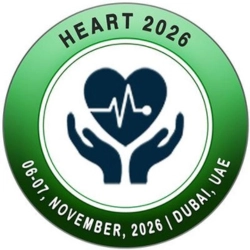Track: Interventional Cardiology

Interventional cardiology has transformed the landscape of cardiovascular care by offering minimally invasive solutions for treating a wide range of heart diseases. This session will explore recent innovations in catheter-based procedures, transcatheter valve therapies, and advanced stent technologies. With a growing emphasis on patient-centric care, interventional cardiology continues to expand its boundaries, providing safer and more effective options for patients.
The global interventional cardiology market is projected to grow at a CAGR of 7.1% from 2024 to 2030, driven by advancements in imaging techniques, the increasing prevalence of coronary artery disease, and technological developments in robotics and bioresorbable scaffolds. This session will also address challenges such as cost-effectiveness, training requirements, and access to advanced technologies in low-resource settings.
Key Topics to Be Discussed:
1. Innovations in Stent Technologies
Explore advancements in stent designs, including drug-eluting stents, bioresorbable vascular scaffolds, and coated stents, and their role in reducing restenosis and thrombosis rates. Discussions will also cover next-generation stents tailored for complex anatomies.
2. Transcatheter Valve Therapies
Delve into transcatheter aortic valve replacement (TAVR) and transcatheter mitral valve repair/replacement (TMVR) procedures. This segment will highlight clinical outcomes, patient selection criteria, and future directions in valve therapy.
3. Imaging and Navigation Technologies
Discover how intravascular imaging tools such as optical coherence tomography (OCT) and intravascular ultrasound (IVUS) are enhancing precision in interventional procedures. The role of artificial intelligence in image interpretation and procedural planning will also be discussed.
4. Advances in Peripheral Interventions
This topic will cover interventions for peripheral artery disease (PAD), including drug-coated balloons and atherectomy devices, emphasizing their effectiveness in improving limb salvage and reducing amputations.
5. Robotic-Assisted Interventions
Learn about the rise of robotics in interventional cardiology, offering enhanced precision, reduced radiation exposure, and improved procedural outcomes. Challenges in adoption and training will also be addressed.
6. Emerging Trends in Complex Procedures
Explore new techniques and tools for addressing chronic total occlusions (CTOs), bifurcation lesions, and left main coronary artery disease. This segment will focus on innovation and expertise in handling challenging cases.
Summary:
This session provides a comprehensive overview of the transformative advancements in interventional cardiology. Attendees will benefit by:
• Learning about cutting-edge stent technologies and their clinical applications.
• Gaining insights into transcatheter valve therapies for valve repair and replacement.
• Understanding the role of advanced imaging and navigation tools in enhancing procedural outcomes.
• Exploring innovations in peripheral interventions for comprehensive cardiovascular care.
• Staying informed about the integration of robotics and AI in interventional cardiology.
Participants will leave equipped with actionable knowledge to integrate these advancements into their practice, improving patient care, procedural safety, and overall outcomes in cardiology.
Scientific Highlights
- Cardiovascular Diseases & Heart Diagnosis
- Cardiac and Cardiovascular Research
- Heart Devices & Innovations
- Cardiovascular Diabetology, Obesity & Stroke
- Interventional Cardiology
- Nuclear Cardiology, Molecular Cardiology, Cardio Oncology
- Pediatric & Women’s Cardiology
- Cardiac & Cardiothoracic Surgery
- Cardiac Arrhythmias & Cardiomyopathies
- Cardiac Nursing Care
- Sports Cardiology & Exercise Physiology
- Echocardiology, Valvular Diseases, Cardiac Imaging
- Heart Regeneration & Transplantation
- Cardiac Pharmacology and Therapeutics
- Cardiac Diet/Cardiac Nutrition
- Current Research and Advances in Cardiology & Case Reports
- Cardiology Future Medicine | AI in cardiology


